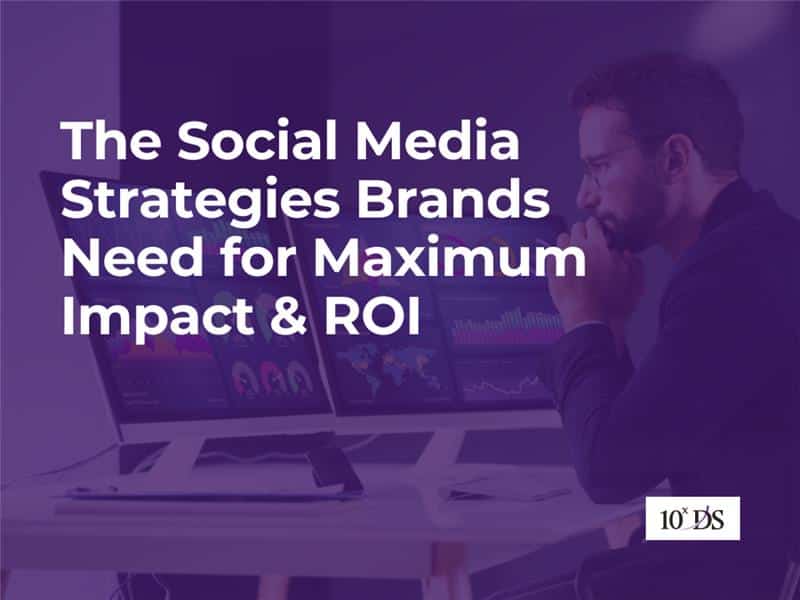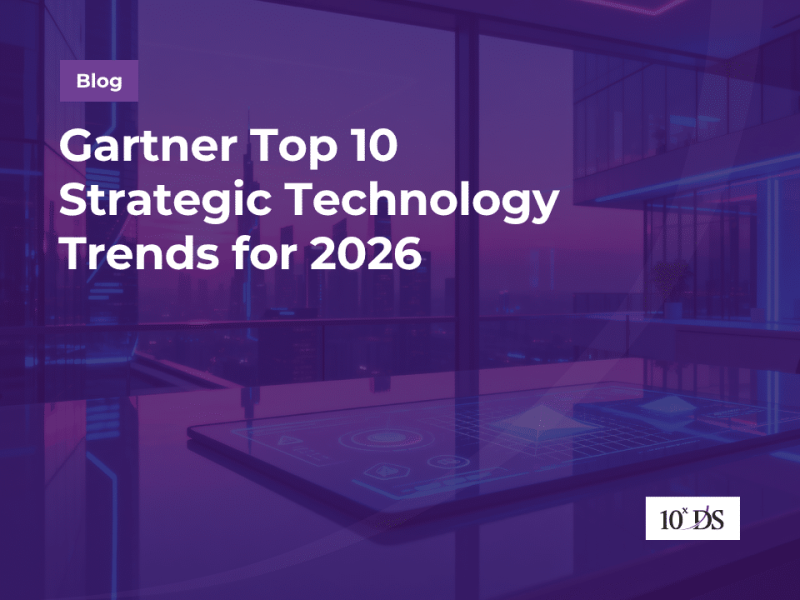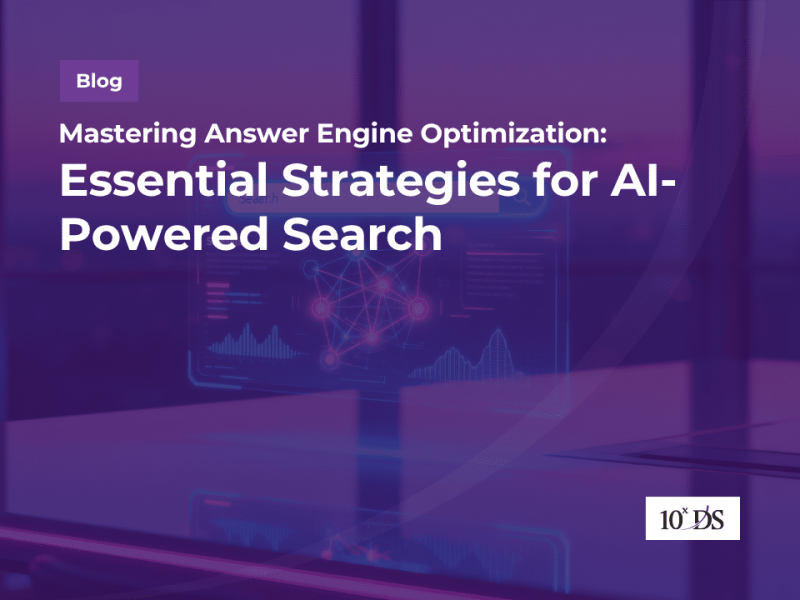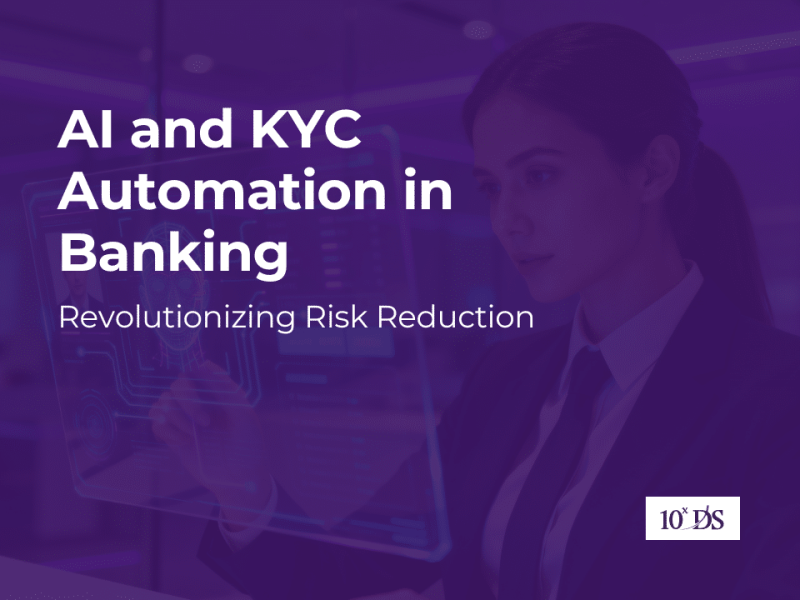
The Social Media Strategies Brands Need for Maximum Impact & ROI
Crafting a robust social media strategy is crucial for businesses looking to enhance brand awareness and achieve a strong return on investment (ROI). It has always been a key factor for brands and businesses to embrace innovation, transforming traditional marketing methods into more personalized and effective engagement strategies. The integration of advanced technologies has further amplified this shift, enabling brands to connect with their audiences in more impactful ways. This blog is tailored for marketing professionals, business owners, social media managers, and digital strategists seeking to stay ahead in the competitive digital space. It explores the latest advancements and best practices in social media brand strategy, providing insights into creating an effective approach that boosts both brand recognition and ROI.
1. Leveraging Artificial Intelligence (AI) and Machine Learning (ML)
Artificial Intelligence and Machine Learning have transformed social media brand strategies by enabling hyper-personalization, predictive analytics, and automation. These technologies analyse vast datasets to predict user behavior, ensuring brands can deliver highly relevant content, optimize ad targeting, and streamline engagement processes. AI-driven tools automate content creation, enhance social media listening, and improve customer service through chatbots, reducing response times and increasing efficiency.
For instance, AI curates personalized content feeds, making platforms like TikTok and Instagram highly addictive by recommending posts based on user behavior. Brands also use AI-powered predictive analytics to optimize posting schedules, ensuring maximum audience reach. A cybersecurity firm, for example, leverages AI-driven sentiment analysis on LinkedIn to assess client feedback, refining its content approach to effectively target IT decision-makers and increasing lead conversions.
2. Enhancing Engagement with Augmented Reality (AR) and Virtual Reality (VR)
Augmented Reality and Virtual Reality are revolutionizing social media engagement by offering immersive brand experiences. AR allows users to interact with products virtually, such as trying on clothing, makeup, or accessories before purchasing, while VR enables businesses to offer virtual product demonstrations, training sessions, and interactive brand experiences. These technologies bridge the gap between digital and physical interactions, significantly enhancing customer engagement and purchase confidence.
Beauty brands like Sephora and L’Oréal use AR-powered filters to let users try on makeup virtually, improving the shopping experience and increasing conversions. In the B2B space, cloud computing providers introduce VR-powered data center tours, allowing potential clients to explore infrastructure remotely. This technology-driven approach not only enhances brand recall but also fosters deeper customer connections by making the digital experience more tangible and interactive.
3. Maximizing Reach with Influencer Marketing and the Creator Economy
The rise of the creator economy has redefined influencer marketing, shifting the focus from celebrity endorsements to niche micro and nano-influencers who offer higher engagement rates and a more loyal audience base. As social media algorithms prioritize authentic content, brands are moving towards long-term influencer collaborations instead of one-off promotions. AI-powered influencer discovery tools now assist brands in identifying ideal content creators based on audience demographics, engagement levels, and relevance.
For example, instead of relying solely on mainstream influencers, B2B companies now partner with industry experts and thought leaders. Tech brands host LinkedIn Live sessions with influential figures to discuss emerging trends, offering valuable insights while promoting their products subtly. Meanwhile, AI-powered influencer marketing platforms like Upfluence and Traackr help businesses track influencer performance and ROI in real time, ensuring data-driven campaign decisions.
4. Prioritizing Data Privacy and Ethical Marketing Practices
With the increasing scrutiny on data privacy, brands must align their social media strategies with ethical marketing practices. Regulations such as GDPR and CCPA require companies to be transparent about data collection, and consumers now demand privacy-first marketing approaches. AI-driven security tools play a crucial role in identifying fraudulent activity, ensuring compliance, and preventing data breaches.
One notable example is Apple’s iOS privacy updates, which limit third-party data tracking and have forced brands to adapt by focusing on first-party data collection. Companies are now leveraging blockchain-based solutions for data security and decentralized advertising models to give users more control over their personal information. Transparency in data handling fosters trust and strengthens brand credibility, making it a non-negotiable element of modern social media brand strategy.
5. Utilizing Ephemeral Content and Stories
Ephemeral content, such as Instagram and Facebook Stories, has gained popularity due to its temporary nature, creating a sense of urgency that encourages immediate engagement. Unlike traditional static posts, ephemeral content fosters real-time interaction and often achieves higher visibility due to its placement at the top of social feeds. Brands use this format for behind-the-scenes content, limited-time promotions, and interactive polls to drive audience participation.
AI-driven tools now allow businesses to automate ephemeral content posting and track engagement metrics in real-time. Additionally, AR-powered Stories enhance interactivity, as seen with Instagram’s branded filters, which encourage user participation. Even B2B brands like IBM have successfully leveraged Stories to provide insights into industry conferences and technological advancements, proving that ephemeral content isn’t just for B2C brands.
6. Engaging Audiences Through Live Streaming and Real-Time Interaction
Live streaming has become an essential component of social media strategy, offering brands an authentic way to engage with their audiences in real time. Platforms like Facebook Live, Instagram Live, YouTube Live, and LinkedIn Live allow businesses to host Q&A sessions, product launches, and industry discussions, fostering community engagement and trust. The rise of 5G connectivity has further enhanced live streaming quality, reduced latency and enabling ultra-HD broadcasts.
AI-powered tools now enhance live streams by providing real-time captions, language translations, and even audience sentiment analysis. For example, Microsoft frequently hosts LinkedIn Live sessions to discuss emerging AI trends, drawing thousands of professionals who engage directly through live Q&A features. Meanwhile, AI chatbots integrated into live streams provide instant responses to audience inquiries, enhancing the user experience without requiring constant human moderation
7. Integrating Social Commerce and Shoppable Posts
Social commerce has transformed social media platforms into seamless shopping experiences, enabling brands to sell products directly within apps like Instagram, TikTok, and Facebook. AI-driven recommendation engines analyse user preferences and behaviours to suggest relevant products, improving conversion rates. Additionally, in-app checkout features eliminate friction in the buying journey, making the process smoother for consumers.
For example, TikTok’s AI-powered shopping feature analyses engagement patterns to showcase the most relevant products to each user. Pinterest’s “Shop the Look” feature uses visual recognition technology to identify products within images and link them to purchase options. Meanwhile, B2B companies are leveraging LinkedIn’s Sales Navigator to generate high-quality leads by identifying key decision-makers within organizations.
8. Harnessing the Power of User-Generated Content (UGC) and AI Content Moderation
User-generated content (UGC) has become one of the most trusted forms of brand marketing, as consumers value peer recommendations over traditional advertising. However, brands must also ensure that UGC aligns with their brand values, which is where AI-powered content moderation tools come into play. These tools automatically filter out inappropriate content, spam, and fake news while promoting genuine customer testimonials and community-driven content.
For instance, companies like Airbnb encourage users to share their travel experiences through branded hashtags, creating an authentic storytelling approach that enhances credibility. Meanwhile, AI-driven sentiment analysis tools help brands monitor online conversations, allowing them to respond promptly to negative feedback and strengthen brand reputation.
9. Implementing AI Chatbots and Conversational Marketing
AI chatbots have revolutionized customer service by providing instant responses, guiding users through purchase decisions, and automating FAQs. With advancements in natural language processing (NLP), chatbots can now deliver human-like interactions, improving customer satisfaction and engagement. They can be integrated into social media platforms like Facebook Messenger, WhatsApp, and Instagram DMs to streamline communication.
For example, fashion retailer H&M uses AI chatbots on messaging apps to provide personalized style recommendations, enhancing the online shopping experience. AI-powered voice assistants are also gaining traction, allowing users to interact with brands hands-free through smart devices. This shift toward conversational marketing ensures brands remain accessible and responsive, 24/7.
10. Measuring Success with AI-Powered Advanced Analytics
Tracking the success of social media campaigns is essential for optimization, and AI-powered analytics tools provide deeper insights into audience behavior, campaign performance, and engagement trends. Predictive analytics help brands forecast the effectiveness of content, while real-time data visualization tools make it easier to interpret complex metrics.
Platforms like Google Analytics 4, Sprout Social, and Brand watch offer AI-driven recommendations, helping brands fine-tune their strategies for maximum ROI. Social listening tools also analyse brand mentions and sentiment, allowing businesses to adapt their messaging based on public perception. By leveraging these insights, brands can refine their social media strategy for sustained growth and engagement.
In the below FAQs section, we answer common questions organizations face when developing a social media strategy, along with best practices to optimize it for maximum impact.
Frequently Asked Questions (FAQs)
1. How Do I Choose the Right Social Media Platform for My Brand?
Different platforms cater to various audiences and business goals. First, conduct audience research to identify where your target customers spend the most time.
- LinkedIn – Best for B2B marketing, industry networking, and thought leadership.
- Instagram – Ideal for visual content, lifestyle brands, and influencer marketing.
- TikTok – Perfect for brands targeting younger demographics with short-form video content.
- Facebook – Good for community building, ads, and engaging diverse age groups.
- Twitter/X – Effective for real-time updates, news, and customer engagement.
- YouTube – The go-to platform for long-form video content and tutorials.
2. How Often Should I Post on Social Media?
Posting frequency varies by platform and audience engagement levels. Recommended posting schedules aligned with industry best practices and insights from leading digital marketing resources are as below:
- Instagram: 3-5 posts per week
- Twitter/X: 1-3 tweets per day
- LinkedIn: 2-3 posts per week
- Facebook: 3-5 posts per week
- TikTok: 3-5 posts per week
These guidelines are based on general trends and may vary depending on your specific audience and industry. It’s essential to monitor your engagement metrics and adjust your posting frequency accordingly to achieve the best results.
3. What Are the Latest Trends in Social Media Marketing?
Staying updated with the latest trends can help brands maintain a competitive edge. Current trends include:
- AI-powered content creation – Tools like ChatGPT, Jasper, and DALL-E are transforming how brands generate content.
- Voice search optimization – Optimizing social posts for voice search is becoming essential.
- Short-form video dominance – Reels, TikTok, and YouTube Shorts continue to drive engagement.
- Decentralized social media platforms – Platforms like Bluesky and Mastodon are gaining traction.
- Social audio experiences – Twitter Spaces and Clubhouse offer real-time engagement opportunities.
4. What Is the Role of AI in Social Media Marketing?
AI has revolutionized social media marketing in the following ways:
- Personalization – AI helps deliver highly relevant content to users.
- Automated content creation – AI-powered tools generate social media posts, captions, and even images.
- Customer interactions – Chatbots provide 24/7 support and engagement.
- Predictive analytics – AI-driven insights help brands anticipate trends and optimize their strategies.
- Social listening – AI tools analyse sentiment and track brand mentions in real-time.
5. How Can I Measure the Success of My Social Media Strategy?
Tracking the right Key Performance Indicators (KPIs) is crucial for measuring success:
- Engagement Rate – Likes, shares, comments, and saves.
- Conversion Rate – Leads generated or purchases made.
- Reach and Impressions – The number of people who see your content.
- Sentiment Analysis – Understanding audience perception.
Tools like Sprout Social, Hootsuite, and Google Analytics 4 provide detailed insights to optimize your strategy.
Conclusion
A successful social media strategy in 2025 requires creativity, data-driven insights, and cutting-edge technology adoption. By leveraging AI, automation, and social commerce, businesses can create impactful campaigns that enhance brand awareness and drive measurable ROI. Staying ahead of trends and optimizing strategies based on analytics will ensure long-term success in the digital age.
Would you like help refining your social media brand strategy for maximum impact? Connect with our Digital Agency team at 10xDS to build an AI-powered social media strategy that sets your brand apart.


